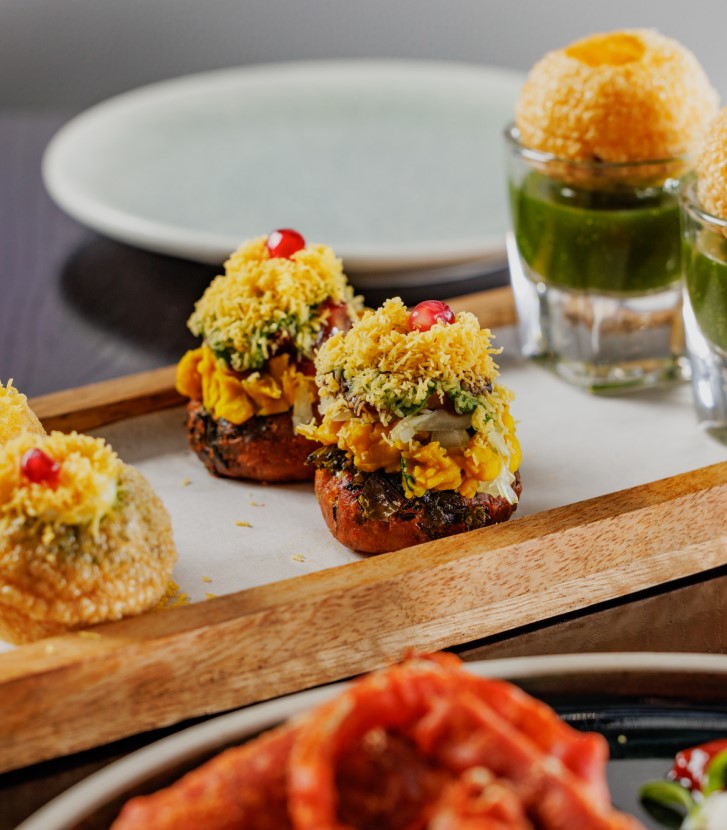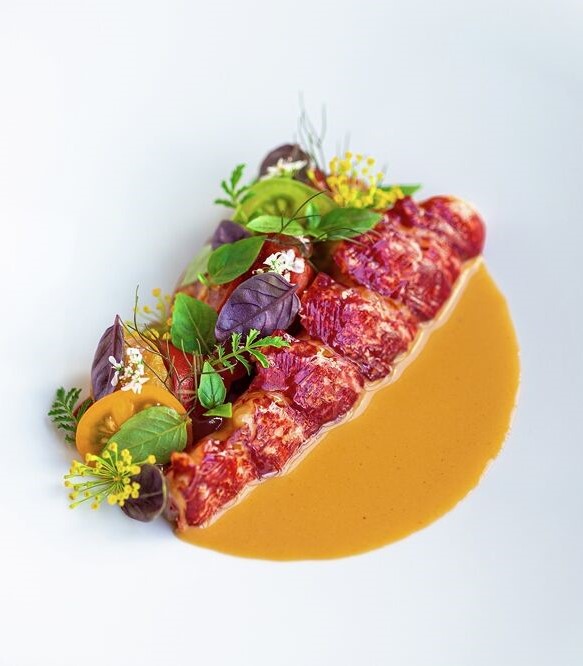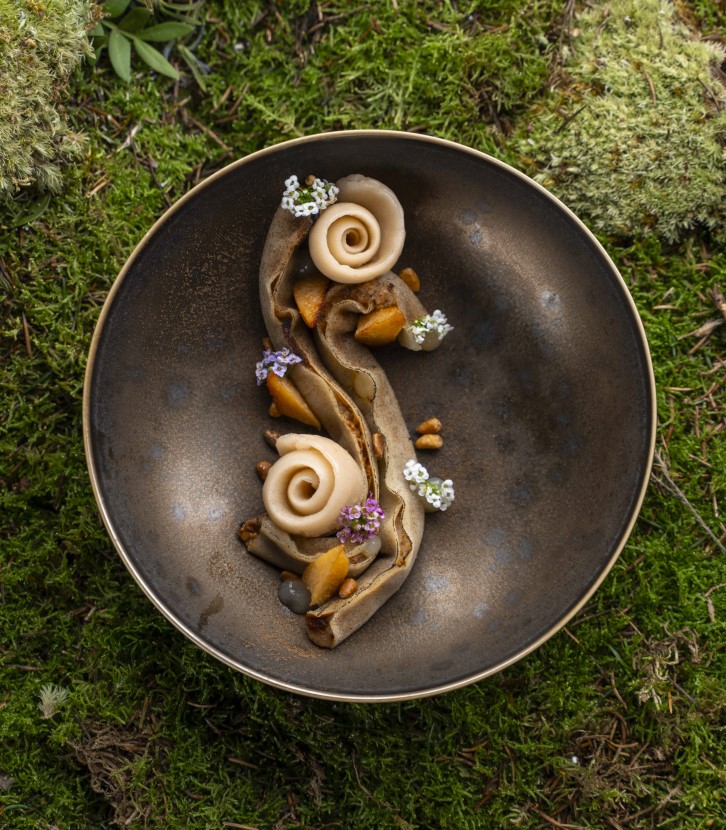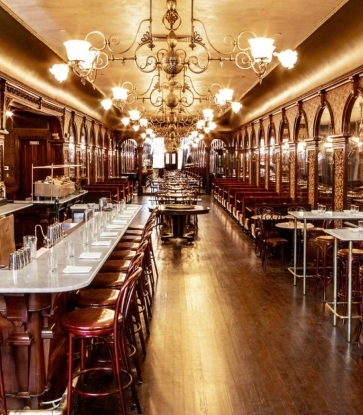Our inspectors looked back on their year of dining experiences to share their favorite dishes. This list is reflective of Tokyo’s diverse culinary scene—some dishes can only be savored in a particular season; some are products of venerable traditions; while others are inspired from the unique experiences of the chefs who created them.
Pastry-baked imperial pigeon in salmis sauce
This aromatically baked pastry is sleek, even aerodynamic, a beauty to behold. Tucked away inside is breast of imperial pigeon, kept company by minced pigeon, truffles, foie gras and spinach. Salmis sauce from viscera is tweaked to avoid heaviness. A modern update of a classic dish.

Fugu caviar
Nothing says ‘winter’ to the Japanese palate like fugu (pufferfish) . Caviar, a Western delicacy, finds expression in classic Baccarat crystal, in a combination conceived in a Japanese restaurant in Paris. Fugu, caviar join sesame tofu to resonate in three-part harmony. An interlacing of Japanese culinary tradition and modern innovation.

Nigiri of young gizzard shad and shiitake
Young gizzard shad is a summer delight for sushi lovers. Each nigiri piece is crafted of three layers of young gizzard shad, pickled in vinegar to brace the delicate flesh. Shiitake mushroom nigiri was inspired by the astounding flavour of Yairo shiitake from Minamiuonuma. The refreshing tang of citrus is a natural companion for the sultry aroma of baked shiitake.


Mineoka tofu
Mineoka tofu, a mystery unravelled from the literature of old Edo, is silky-smooth and richly flavourful. Wasabi enhances its sweetness, for a lingering, flavoursome finish that lasts and lasts. The plate , crafted to depict a tree frog on a lotus leaf, whimsically complements the simplicity of the arrangement.

Nigiri of tiger prawn and simmered Orient clam
Sushi items are meticulously selected, allowing no compromise in quality. Prawns have their sweetness drawn out at a freshly-boiled temperature, with their innards carefully sandwiched between the prawn and the rice for optimal taste, Orient clam is brushed with soy syrup and simmered to impart a deep, rich flavour. Each piece is a study in beauty, dignifying the flavour within.
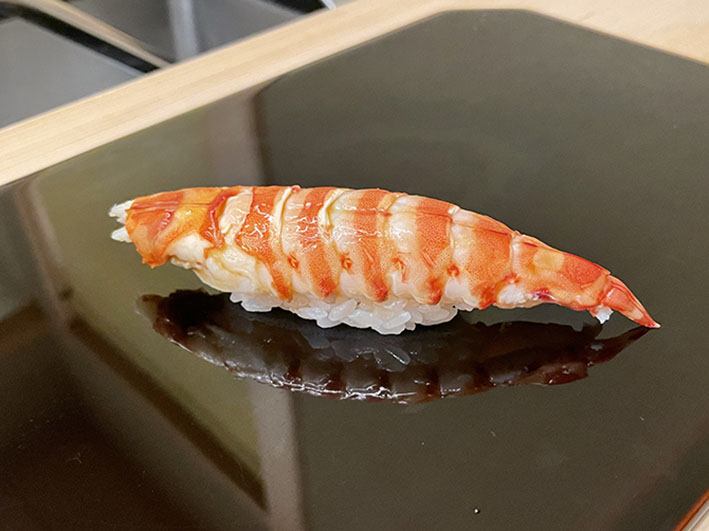

Freshwater–225 MASL watermelon, watershield , sweetfish
Maz interprets the food culture of Peru through Japanese ingredients. With stunning originality, char, watershield, and watermelon interweave with powdered sweetfish. Vessels are placed on mats fashioned from the skins of freshwater fish from the Amazon. A spiritual atmosphere pervades.
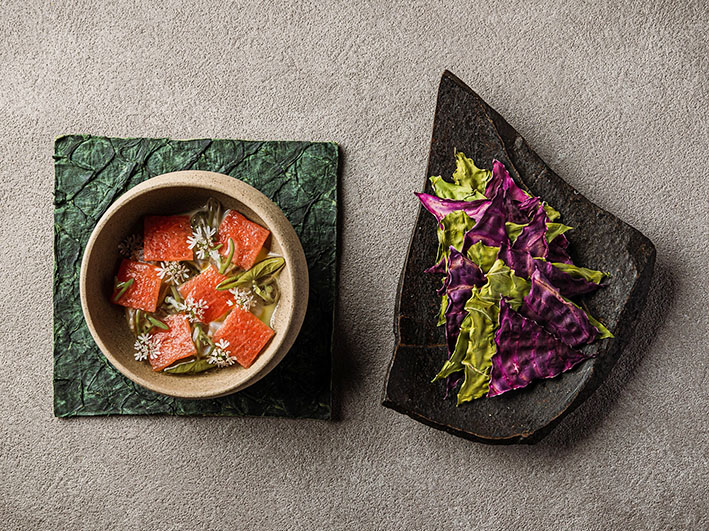
Baked sesame tofu and pea pureed soup
The unripe fragrance of pea soup wafts in the air. Orient clam is also in season. The pungency of baked sesame tofu contrasts with its smooth texture. The olive green of the pureed soup suggests sprouting buds, while the flower and butterfly motifs of the lid announce the advent of spring.

Straw-grilled duck
Fragrant straw smoke wreathes the blood-red meat, transforming the iron in the duck into a soup stock -like aroma. A little salt draws out the flavour imparted by the flawlessly-kindled straw. Tenderloin is served with sieve-pureed liver and chopped ginger.

Linguine of lobster and velvet shrimp
Pasta as al dente as only dry noodles can be, the sauce rich in the flavour of crustacean and tomatoes. Richard Ginori plateware complements the red of this Italian pasta offering. The japonisme of the plate’s motif, influenced by Imari ware from the Edo period , is rich with meaning.

Extreme enoki sausage
A sausage stuffed with lashings of enoki mushroom. The glossy sauce is a reduction of vegetable bouillon. Soft-boiled quail eggs take a hint from tsukune, the meatloaf skewer served with a raw egg yolk of yakitori fame. The marvellous side ingredient elevates the main star of this dish.
Boiled spring vegetable, masu salmon tempura
This dish testifies to the vital role of food producers in providing the flavours of the season. Green peas and fava beans herald the first green shoots of spring; tomatoes from Awajishima arrive at peak deliciousness. Gelatine of a mix of soy sauce and vinegar defines the contours of the taste. Announcing the Hokkaido spring, tempura of masu salmon takes the seasonal mood up a notch.

Tomatoes
Bright red tomatoes are dressed with clear jelly and sherbet. Temperature and texture are varied to assemble multiple layers of sour and sweet sensations. Caviar and smoked sauce create a dense, lingering finish. This cuisine is an homage to the ingredients.

Pineapple
Gucci Osteria da Massimo Bottura Tokyo
Okinawa is the inspiration for this tarte Tatin. ‘Butterfly’ chips alight on this work of art, drawn by the aromas of singed meringue and pineapple drenched in the Okinawa sun. A summer dessert rich with the fragrance and sweetness of fruit.
Impepata of white asparagus and Orient clam
White asparagus, with its vibrancy, faint sweetness and hint of bitterness, multiplies the flavour of steamed Orient clam, while the sauce, an emulsification of shellfish extract, brings it all together. Fragrance of pepper lends an accent. The degree of perfection in this dish is astounding.
Biwa
This botan shrimp dish takes its name from the biwa, a type of lute, which it resembles. Botan shrimp is enrobed in an emulsified sauce of pickled-vegetable juice called pao cai; micro-herbs trace the ‘strings’. A two-part harmony of Sichuan culinary traditions and modern innovation.

Crème Chantilly of Miyazaki mango shortbread
When you dip your spoon into the mango, the texture is like nothing you expected. Below the fruit flesh lie layers of sorbet, whipped cream and meringue; on top, whipped cream studded with shortbread. Simple, yet bursting with creativity.

Sichuan sliced spicy garlic pork
Slices of aubergine and pork are arranged, precisely and delicately, on a celadon porcelain platter. Sichuan cuisine uses cucumber, but its substitution with aubergine elevates the dish. Does this bold arrangement suggest petals? Feathers of a phoenix? There is romance in letting your imagination wander Let your imagination wander.
Boiled new-season’s onion
A disc of the new season’s onion floats amid a black bowl, like the moon shining on a pitch-black night. Aiming to present Japanese cuisine that is not dependent on kombu kelp and dried bonito flakes, in preparation as well as arrangement Myoujyaku adopts a ‘less is more’ aesthetic. Salt and water are this dish’s only seasonings.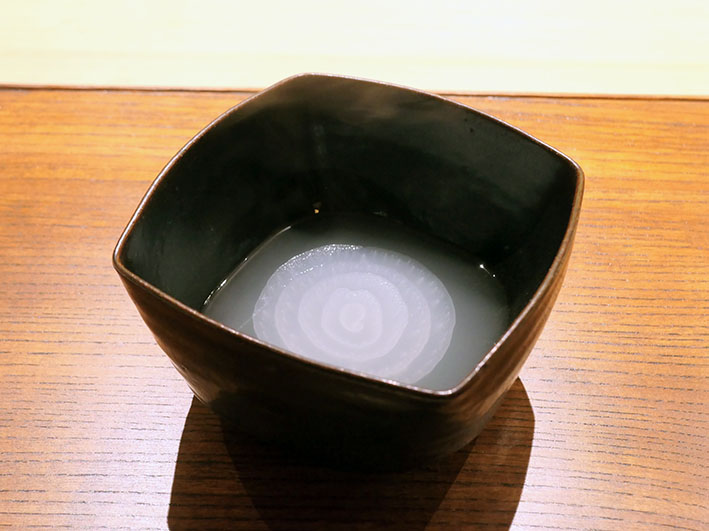
Orient clam, rhubarb, temple juniper berries; quiet voice
The red and purple inflorescence of perilla leaf reflect in the pure white of the plate. Orient clam is par-cooked with steam. Butter awakens the umami of the succinic acid in the sauce, bringing it together. Roasted temple juniper berries are agreeably fragrant, forming a lasting impression of the aromas of herbs and spices.

Beef-wrapped bamboo shoots
When you lift the lid on the cherry-coloured ceramic box, the delightful fragrance of young pepper leaves wafts from within. Multiple paper-thin layers of beef wrap bamboo shoots like a ceremonial kimono. Vegetables wrapped in meat is a common household dish in Japan; here, the gossamer layers of beef elevate it to a masterpiece of Japanese cuisine.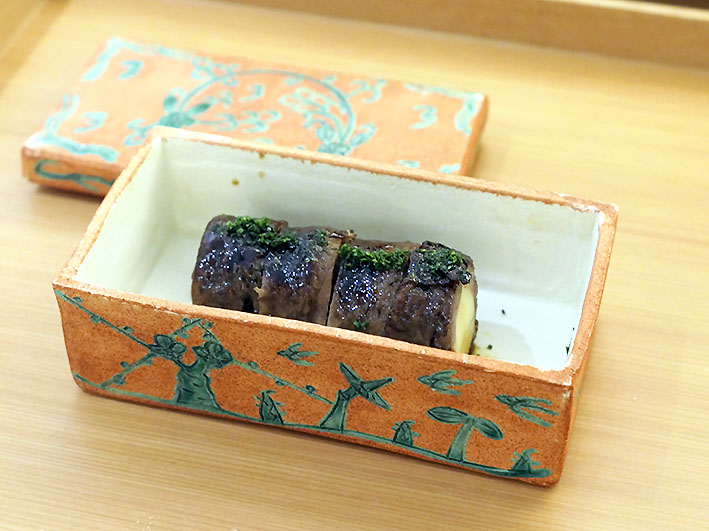
Top Image: ⒸMAZ







